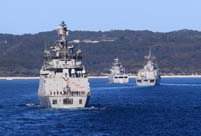 |
| Party chief Xi Jinping (right) meets with Vincent Siew, honorary chairman of the Taiwan-based Cross-Straits Common Market Foundation, on Sunday ahead of the 21st informal economic leaders' meeting of the Asia-Pacific Economic Cooperation forum on the Indonesian resort island of Bali. [Photo/Xinhua] |
Problems should not be handed down to later generations, Xi says
Political disputes between the Chinese mainland and Taiwan could be gradually and eventually resolved, Party chief Xi Jinping said on Sunday.
He made the remarks while meeting Vincent Siew, honorary chairman of the Taiwan-based Cross-Straits Common Market Foundation, ahead of the 21st informal economic leaders’ meeting of the Asia-Pacific Economic Cooperation forum on the Indonesian resort island of Bali.
"We cannot hand those problems down from generation to generation," Xi said.
The concept that "both sides of the Straits are of one family" should be advocated, Xi said, adding that the two sides should strengthen communication and cooperation and jointly work for the great rejuvenation of the Chinese nation.
During the 40-minute meeting, Xi said that it is important for the mainland and Taiwan to seize the historic opportunities to keep up the good momentum of the peaceful development of cross-Straits relations.
Xi noted that enhancing cross-Straits political trust and consolidating a common political basis are "crucial" to ensuring peaceful development of cross-Straits ties.
"We should set our sights on the future," Xi said.
He advised that the principals of departments-in-charge from the two sides may meet and exchange ideas for cross-Straits affairs.
Siew hailed the development of cross-Straits relations over the past five years, saying Taiwan and the mainland should expand economic and trade cooperation.
It was the second meeting between the two since March. Their first meeting took place on the sidelines of the Boao Forum for Asia held in Hainan province in April.
Experts said they believe the talks between Xi and Siew were a positive sign for both sides to strengthen trade ties, which will pave the way for deepening political and cultural exchanges.
"As a representative of (Taiwan leader) Ma Ying-jeou, Siew, to some extent, conveys messages from Ma. The talks will lay a good foundation to solve differences between the two sides," said Ni Yongjie, deputy director of the Shanghai Institute of Taiwan Studies.
"Xi’s words on solving problems that exist between the two sides, step by step, show hope that the two sides could reach a consensus on certain issues soon," Ni said.
Siew, a former Taiwan senior official, has participated in the Asia-Pacific Economic Cooperation forum twice since the 1990s. He was nicknamed by Ma Ying-jeou as Taiwan’s "chief economic designer" due to his strategic thoughts on trade and business.
Wang Yingjin, professor at the School of International Studies of Renmin University of China, said that Siew’s experience on business and politics will contribute to further economic cooperation between the two sides.
"The concept of a co-market of the mainland and Taiwan was proposed by Siew. He is a good delegate to talk with the mainland on business," he said.
Although not all problems could be solved overnight, he said, the two sides should not avoid facing them. "Working together to tackle the problems is the right way."
Shortly after the meeting, Zhang Zhijun, the mainland’s Taiwan affairs top official, chatted with Wang Yu-chi, Taiwan’s official in charge of mainland affairs. Both participated in Xi’s meeting with Siew.
Wang proposed that they should realize mutual visits, which Zhang agreed to, according to a press release by the mainland’s Taiwan Affairs Office.
Zhang said he welcomed Wang visiting the mainland "at the proper time".
According to a cross-Straits service trade agreement that was signed in June, the Chinese mainland will open 80 service sectors to Taiwan, while, in response, Taiwan will open 64 sectors.
It is one of several follow-up agreements to the Economic Cooperation Framework Agreement, a comprehensive cross-Straits economic pact signed in 2010.
Experts said that the two sides could deepen exchanges in wholesaling, retailing, finance, telecommunications and healthcare, as the mainland moves to upgrade its economy.
According to the Taiwan Affairs Office of the State Council, cross-Straits trade reached a historic high of $168.96 billion in 2012, and the mainland’s investment in Taiwan increased 10-fold compared with 2011.
In 2012, more than 2,000 projects, with a total investment of $2.8 billion from Taiwan, were permitted to operate in the mainland.
 Police officer injured after gunshots outside Capitol
Police officer injured after gunshots outside Capitol 11 countries' warships arrive at Jervis Bay for security exercise
11 countries' warships arrive at Jervis Bay for security exercise Chinese tycoon aims to restore London's Crystal Palace
Chinese tycoon aims to restore London's Crystal Palace A staple of southern Chinese people
A staple of southern Chinese people Portrait of an amateur Waltz dancer
Portrait of an amateur Waltz dancer Tourists take pictures beside Qinghai Lake in Xining
Tourists take pictures beside Qinghai Lake in Xining Travel with photographer- Gansu province
Travel with photographer- Gansu province  Serena Williams stumbles through to quarterfinals
Serena Williams stumbles through to quarterfinals Thailand Mobile Expo 2013 kicks off
Thailand Mobile Expo 2013 kicks off Photo collection of Chinese Navy
Photo collection of Chinese Navy People mourn for victims of mall attack
People mourn for victims of mall attack Twins Culture Festival kicks off in Beijing
Twins Culture Festival kicks off in Beijing UNESCO world heritage site: Montale Tower
UNESCO world heritage site: Montale Tower Li Na vs Novak Djokovic in charity match before 2013 China Open
Li Na vs Novak Djokovic in charity match before 2013 China Open American batman soars through China's Jianglang Mountain
American batman soars through China's Jianglang MountainDay|Week|Month